Testes genéticos inconclusivos: Como explicar a incerteza
DOI:
https://doi.org/10.25753/BirthGrowthMJ.v32.i2.32823Downloads
Referências
Haskell GT, Adams MC, Fan Z, Amin K, Guzman Badillo RJ, et al. Diagnostic utility of exome sequencing in the evaluation of neuromuscular disorders. Neurol Genet. 2018;4(1):e212. doi: https://doi.org/10.1212/NXG.0000000000000212.
Kingsmore SF, Cakici JA, Clark MM, Gaughran M, Feddock M, Batalov S, et al. RCIGM Investigators. A Randomized, Controlled Trial of the Analytic and Diagnostic Performance of Singleton and Trio, Rapid Genome and Exome Sequencing in Ill Infants. Am J Hum Genet. 2019;105(4):719-733. doi: https://doi.org/10.1016/j.ajhg.2019.08.009.
Richards S, Aziz N, Bale S, Bick D, Das S, Gastier-Foster J, et al. ACMG Laboratory Quality Assurance Committee. Standards and guidelines for the interpretation of sequence variants: a joint consensus recommendation of the American College of Medical Genetics and Genomics and the Association for Molecular Pathology. Genet Med. 2015;17(5):405-24. doi: https://doi.org/10.1038/gim.2015.30.
Kazazian J, Boehm CD, Seltzer WK. ACMG recommendations for standards for interpretation of sequence variations. Genetics in Medicine, 2000;2(5):302-303. doi: https://doi.org/10.1097/00125817-200009000-00009.
Richards CS, Bale S, Bellissimo DB, Das S, Grody WW, Hegde MR, et al. Molecular Subcommittee of the ACMG Laboratory Quality Assurance Committee. ACMG recommendations for standards for interpretation and reporting of sequence variations: Revisions 2007. Genet Med. 2008;10(4):294-300. doi: https://doi.org/10.1097/GIM.0b013e31816b5cae.
ACMG/ClinGen/AMP/CAP Standards for Classifying Sequence Variants - Presentation in the ACMG Annual Clinical Genetics Meeting 2023 - https://www.acmgmeeting.net/conference-program/acmg/clingen//cap-standards-classifying-sequence-variants.
Cornthwaite M, Turner K, Armstrong L, Boerkoel CF, Chang C, Lehman A, et al. Impact of variation in practice in the prenatal reporting of variants of uncertain significance by commercial laboratories: Need for greater adherence to published guidelines. Prenat Diagn. 2022;42(12):1514-1524. doi: https://doi.org/10.1002/pd.6232.
Jez S, Martin M, South S, Vanzo R, Rothwell E. Variants of unknown significance on chromosomal microarray analysis: parental perspectives. J Community Genet. 2015;6(4):343-9. doi: https://doi.org/10.1007/s12687-015-0218-4.
Makhnoon S, Shirts BH, Bowen DJ. Patients' perspectives of variants of uncertain significance and strategies for uncertainty management. J Genet Couns. 2019;28(2):313-325. doi: https://doi.org/10.1002/jgc4.1075.
Mighton C, Shickh S, Uleryk E, Pechlivanoglou P, Bombard Y. Clinical and psychological outcomes of receiving a variant of uncertain significance from multigene panel testing or genomic sequencing: a systematic review and meta-analysis. Genet Med. 2021;23(1):22-33. doi: https://doi.org/10.1038 s41436-020-00957-2.
Menke C, Nagaraj CB, Dawson DB, He H, Tawde S, Wakefield EG. Understanding and interpretation of a variant of uncertain significance (VUS) genetic test result by pediatric providers who do not specialize in genetics. J Genet Couns. 2021; 30: 1559–1569. doi: https://doi.org/10.1002/jgc4.1422.
Downloads
Publicado
Como Citar
Edição
Secção
Licença
Direitos de Autor (c) 2023 Maria Abreu, Cláudia Falcão Reis, Sílvia Álvares

Este trabalho encontra-se publicado com a Creative Commons Atribuição-NãoComercial 4.0.
Copyright e Direitos dos Autores
Todos os artigos publicados na Revista Nascer e Crescer – Birth and Growth Medical Journal são de acesso aberto e cumprem os requisitos das agências de financiamento ou instituições académicas. Relativamente à utilização por terceiros a Nascer e Crescer – Birth and Growth Medical Journal rege-se pelos termos da licença Creative Commons "Atribuição - Uso Não-Comercial - (CC-BY-NC)"".
É da responsabilidade do autor obter permissão para reproduzir figuras, tabelas, etc. de outras publicações.
Juntamente com a submissão do artigo, os autores devem enviar a Declaração de conflito de interesses e formulário de autoria. Será enviado um e-mail ao autor correspondente, confirmando a receção do manuscrito.
Os autores ficam autorizados a disponibilizar os seus artigos em repositórios das suas instituições de origem, desde que mencionem sempre onde foram publicados e de acordo com a licença Creative Commons.


